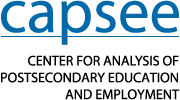CAPSEE Publications
The Labor Market Returns to Math Courses in Community College
By: Clive Belfield & Vivian Yuen Ting Liu | March 2015
Using matched college transcript and earnings data on over 80,000 students entering community college during the 2000s, this paper examines the returns to math courses.
On Their Own Terms: Two-Year Minority Serving Institutions
By: Thai-Huy Nguyen, Valerie Lundy-Wagner, Andrés Castro Samayoa, Marybeth Gasman, Audrey Wilson, Desmond Diggs, Melanie Wolff, Carolina Dávila, & William Boland | Center for Minority Serving Institutions, Graduate School of Education, University of Pennsylvania | February 2015
This report looks at the role of two-year Minority Serving Institutions (MSIs) in improving postsecondary access and degree completion for disadvantaged students in the United States.
What About the Non-Completers? The Labor Market Returns to Progress in Community College
By: Matthew Zeidenberg, Marc Scott, & Clive Belfield | February 2015
Using a novel method for linking non-completers with completers, this paper calculates the labor market returns to programs of study, accounting both for those who obtain an award and those who do not. A version of this paper is available in the Economics of Education Review.
Does Developmental Education Improve Labor Market Outcomes? Evidence From Two States
By: Michelle Hodara & Di Xu | December 2014
Using longitudinal student-unit record data linked to wage record data, this paper estimates the labor market returns to developmental credits versus college-level credits in two states. A version of this paper is published in the American Educational Research Journal.
Pell Grants as Performance-Based Aid? An Examination of Satisfactory Academic Progress Requirements in the Nation’s Largest Need-Based Aid Program
By: Lauren Schudde & Judith Scott-Clayton | December 2014
This paper examines the prevalence and consequences of Pell Grant recipients’ failure to meet the standards for satisfactory academic progress required for grant renewal. A version of this paper is published in Research in Higher Education.
What About Certificates? Evidence on the Labor Market Returns to Non-Degree Community College Awards in Two States
By: Di Xu & Madeline Joy Trimble | November 2014
Based on detailed student-level information from matched college transcript and employment data in two states, this paper explores the relationship between earning a certificate and student earnings and employment status after exiting college. A version of this paper is available in Educational Evaluation and Policy Analysis.
The Early Impact of Postsecondary Career and Technical Education: Do Workers Earn More in Occupations Related to Their College Major?
By: Madeleine Gelblum | November 2014
This study explores the relationship between college major, occupation, and early-career annual earnings.
On Second Chances and Stratification: How Sociologists Think About Community Colleges
By: Lauren Schudde & Sara Goldrick-Rab | October 2014
This article provides an overview of sociology’s approach to understanding community colleges. The authors describe sociological theories, examine the contributions they make to the field, and discuss the discipline’s recent debates regarding community colleges. This article has been published in the Community College Review.
The Value of Postsecondary Credentials in the Labor Market: An Experimental Study
By: David Deming, Noam Yuchtman, Amira Abulafi, Claudia Goldin, & Lawrence F. Katz | October 2014
This paper assesses employers’ perceptions of postsecondary degrees from different types of institutions using a resume audit field experiment. The authors focus on various comparisons, including for-profit institutions versus public institutions and more-selective versus less-selective public-sector institutions. A version of this paper appears in the American Economic Review.
Evaluating For-Profit Higher Education: Evidence from the Education Longitudinal Study
By: Yuen Ting Liu & Clive Belfield | September 2014
Using the Education Longitudinal Study of 2002, this study evaluates the postsecondary and labor market outcomes of students who attended for-profit colleges.
